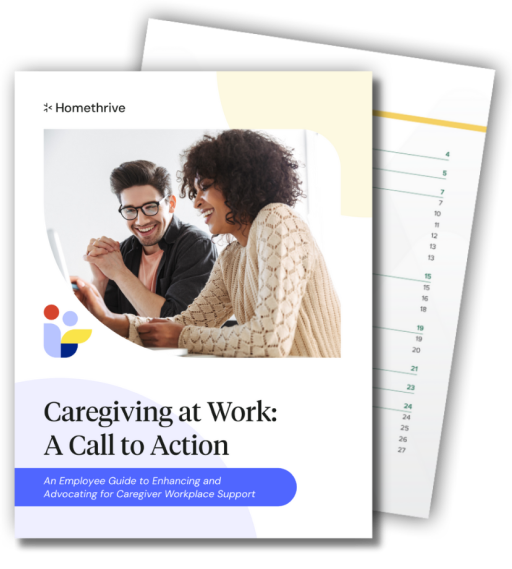A seasoned account executive calls out several times a month.
A veteran writer is frequently late for work and often leaves early.
The top-performing salesperson is requesting a leave of absence to handle some “personal business.”
If any of this sounds familiar, there’s a good chance these hardworking employees are among the 20% of your team doubling as unpaid family caregivers.
That account executive is actually taking their mom to the doctor; the writer can’t find childcare, and the salesperson has a child with special needs who must have important therapy and treatments.
The fact is, of that group, one in three might quit because of the snowball effect of caregiving on their career.
At Homethrive, our mission is to help you help your employees navigate caregiving so they can be present, productive, and generally healthier!
Check out this quick video to hear Homethrive’s Co-CEO & Co-Founder, Dave Jacobs, offer some best practices for caring for the caregivers within your organization:
{% video_player “embed_player” overrideable=False, type=’hsvideo2′, hide_playlist=True, viral_sharing=False, embed_button=False, autoplay=False, hidden_controls=False, loop=False, muted=False, full_width=False, width=’1920′, height=’1080′, player_id=’100162746252′, style=” %}
Here are four tips for identifying and helping the caregivers on your own team!
1. Actively listen to your employees to understand their needs and help them identify what type of caregiver they are; then, create a safe and judgment-free environment so employees can speak freely about their challenges and worries.
Believe it or not, most people actively caring for a loved one don’t consider themselves to be a “caregiver.” They also don’t think about all the hours, expenses, and stress associated with caring for their loved one. They may simply see themselves as a family member or friend lending a helping hand. And often, they’re unaware of just how much the work and worry of caregiving is impacting their life until they burn out and must make hard choices – such as leaving your company.
2. Be flexible and support the unique schedules and lifestyles of your employees. This could include offering remote work options or being flexible with work schedules throughout the day.
For many employees, their mindset has even shifted towards a “life-work tilt.” Quality time with family, the opportunity to explore passions outside of work, and overall mental well-being are beginning to trump career advancement, raises, and professional praise.
Leaning into this “life-work tilt” concept may prove to be beneficial for your organization. By proactively acknowledging the needs and responsibilities of family caregivers and offering tangible support, you can set your organization apart. As a result, when your employees find a better balance between work and life, they can focus better, be more productive, and stay loyal to your company.
3. Offer a caregiving benefit that has the power to address turnover, reduce stress levels, decrease burnout, and increase productivity, such as our solution.
Dari by Homethrive’s expert Care Guides, credentialed caregiving experts with years of experience helping families navigate challenges, are the power behind everything we do. Their personal connection with our members gives them unique insight into the needs and challenges of caring for a loved one, from how to manage challenging behavior to finding the right home delivery services. This insight, expertise, and empathy for the caregiver is what differentiates Dari by Homethrive.
4. Implement robust and thoughtful well-being programs to support employee mental health.
There’s a clear connection between caregiving and mental health. For example, according to a Blue Cross Blue Shield report, 57% of caregivers are facing clinical depression & anxiety.
The stress, strain, work, and worry associated with family caregiving can really take a toll on someone’s mental health. Supplementing family caregiving support with comprehensive mental health care coverage has synergistic effects that will improve employee well-being across the board.
To learn more about supporting family caregivers, check out more resources on our website. To receive insights delivered straight to your inbox, sign up for our weekly newsletter!







